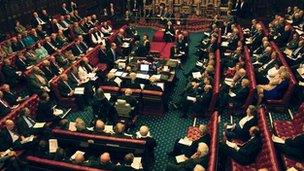Late night votes on gay marriage could be a headache for Cameron
- Published

The level of turnout in divisions often hinges on when votes are held in the Lords
Most Lords insiders reckon there is a comfortable majority for gay marriage in the Upper House - but maybe not at 2am on a Tuesday morning.
The ever-lengthening speakers list for the Second Reading of the Marriage (Same Sex Couples) Bill, this Monday - 79 and counting - suggests the debate will drag on long past midnight.
And in that kind of "debate till you drop" situation, many of the more frail peers may not manage to stay the course.
It's a mistake to imagine that support or opposition to the Bill is along generational lines, with sprightly younger peers in favour, and the older vintage against.
Supporters of the Bill seem genuinely worried that, without a bit of deft rescheduling, the opponents could vote it down because the majority in favour that they believe exists could not be mustered late at night.
'Fatal motion'
Normally this danger never threatens at this stage, but the crossbench peer Lord Dear has put down a "fatal motion " to deny the Bill its Second Reading.
This is a pretty unusual event in the Lords, where, by convention, government bills are not normally opposed till later.
The last precedent I can think of is the late Baroness Young opposing a reduction of the age of consent for gay sex, in 2000. Lord Dear believes the vote will be close although he admits it is hard to gauge.
I gather the government's business managers in the House have come under heavy pressure from Labour and the crossbenches to either allow the Second Reading debate to start early - perhaps at 10.30 or 1100 BST on Monday.
This is so a vote could be taken at a more reasonable hour, like 2100 BST, or allow the debate to be adjourned and continue it on Tuesday morning.
Either option, or a combination of both, would avoid the prospect of a defeat in the small hours of Tuesday, the Bill's supporters argue. But the government side are, so far, unmoved.
Parliamentary marathon
So the unofficial whips on both sides are preparing for another parliamentary marathon.
Supporters of the Bill are planning to wear pink and are pondering suitable DVDs to play in a committee room, to entertain the troops while the debate lumbers on.
The basic arithmetic is that, on a free vote, the vast majority of Labour and Lib Dem peers, plus half the crossbenchers and perhaps 50 Conservatives, will support the Bill.
If those votes can be mustered, they should comfortably trump those against it.
But that "if" troubles the "Yes" side of the argument. They argue that bad parliamentary management - by allowing a late night vote - is threatening the Bill, or at least offering the opposition the chance of a morale-boosting near miss.
And that could matter rather a lot, a little further on in the parliamentary process, because there could well be further late night votes in the two days scheduled for Committee Stage consideration of the Bill on 17 and 19 June.
There are likely to be big battles ahead on issues of detail around conscientious objectors in, for example, faith schools and registry offices, and late night ambushes might well be staged.
Dragging on
But what would happen if Lord Dear defeated the Bill before it got to committee?
That would be horrible for David Cameron. He would undoubtedly face demands to over-ride their Lordships by using the Parliament Act.
This would then entail passing the Bill in the same form in the next session of Parliament, after May 2014.
The timing here is particularly nasty for him, because he would have to reprise an argument which put him at odds with many in the Tory grassroots, just as he was going into a difficult set of Euro elections, with the siren song of the UK Independence Party luring away his traditional supporters.
Alternatively he could drop a bill he had devoted much personal effort to supporting, and be ridiculed for betrayal.